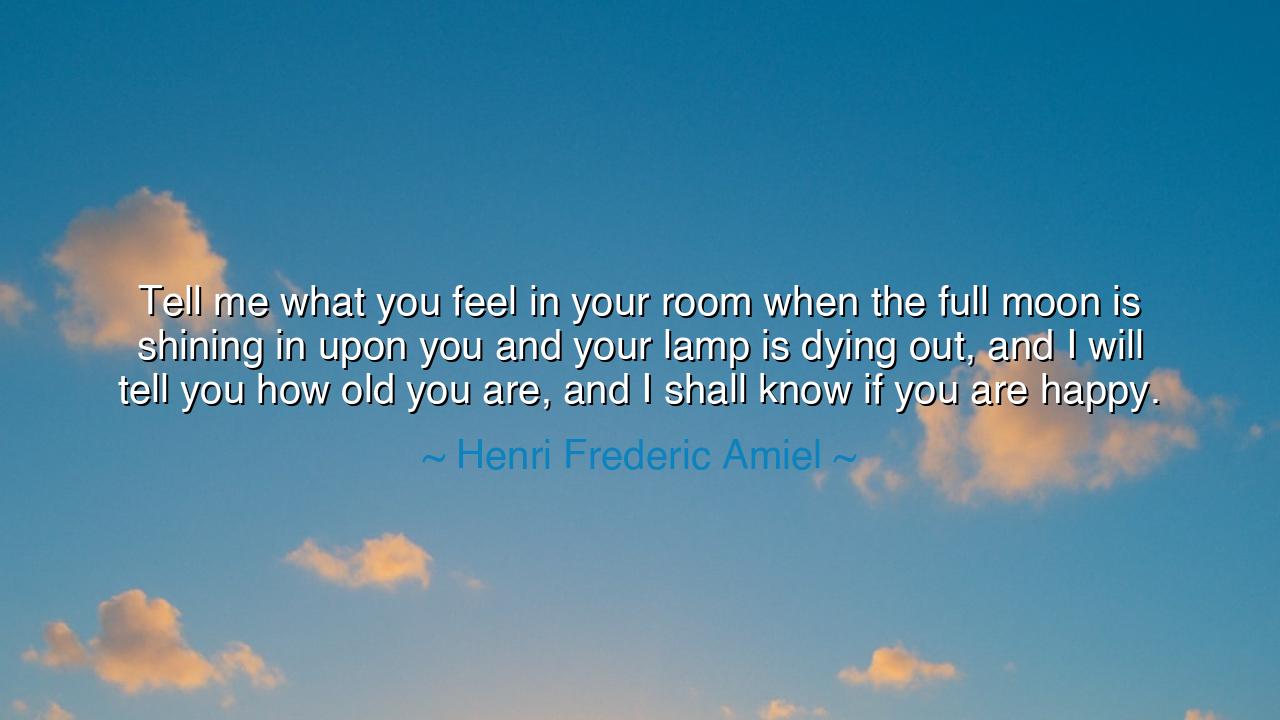
Tell me what you feel in your room when the full moon is shining
Tell me what you feel in your room when the full moon is shining in upon you and your lamp is dying out, and I will tell you how old you are, and I shall know if you are happy.






“Tell me what you feel in your room when the full moon is shining in upon you and your lamp is dying out, and I will tell you how old you are, and I shall know if you are happy.” — thus spoke Henri Frédéric Amiel, the philosopher of the soul’s quiet hours. These words are not a question but a revelation: they invite us to look within, to see how the heart speaks when the world grows silent. In the solitude of night, when the lamp is dying and the moonlight replaces it, we are face to face with the eternal. There, in that soft silver glow, the masks of the day fall away, and the soul stands alone before its own truth. What we feel in that moment—fear or peace, restlessness or wonder—reveals the state of our spirit, the measure of our age, not in years, but in innocence or weariness.
For the young in heart, the full moon awakens reverence and dreams. They see not loneliness, but beauty; not the fading of the lamp, but the promise of dawn. To them, the night is alive—every shadow whispers of mystery, every breeze carries the song of eternity. Yet for the old in spirit, whether their hair is gray or not, the moonlight may bring melancholy. It reminds them of the things that have passed, of time’s relentless flow, of joys no longer theirs. Thus, Amiel speaks not of the body’s age, but of the soul’s age—whether it still finds wonder in the quiet, or whether it trembles before its own thoughts.
The dying lamp symbolizes the light of reason, the glow of human effort, the comfort of what is known. The moonlight, by contrast, is the light of mystery—the divine, the infinite, that which cannot be controlled or explained. When the lamp fades, when our distractions and duties grow still, the moonlight of the eternal world seeps in through the cracks. It is then that our hearts are tested. Some recoil from its chill, fearing the vastness beyond their understanding. Others open their eyes and find peace in its radiance, feeling the pulse of life that connects all things. Happiness, says Amiel, lies not in the abundance of light, but in the courage to face the darkness with serenity.
Think of Vincent van Gogh, who stood under the full moon in the fields of Arles, painting the stars as if they were the thoughts of God. His mind wrestled with sorrow, yet he found solace in the harmony of the night sky. Though tormented, he still saw beauty—the moonlight did not drive him into despair but filled him with awe. His heart, wounded yet alive, felt the grandeur of existence. In that silent communion with the cosmos, he was, for a moment, truly happy. It was not wealth or comfort that brought him peace, but the ability to feel deeply, to be moved by the silent conversation between man and the universe.
Amiel’s words remind us that the test of happiness is not in what we possess, but in what we perceive when we are alone. If solitude becomes unbearable, it is not the night that torments us—it is our own unrest. If moonlight feels cold, it is because the heart has forgotten how to glow from within. But if we can sit in that quiet hour and feel the stillness as a friend, if the dying lamp does not frighten us but teaches us to look toward gentler lights, then we are truly at peace with life. Happiness is the art of harmony between the outer silence and the inner song.
To the ancients, this understanding was sacred. The wise of Greece, the monks of the desert, the poets of Persia—all knew the moon as a mirror of the soul. They sought its company not to escape the world, but to hear its whispers. For when one learns to dwell peacefully in one’s own presence, one discovers that the divine is near. The moonlight becomes not a reminder of emptiness, but a bridge to the infinite. The heart that welcomes the night is ageless, for it carries the timeless light of understanding.
Let this be the teaching for those who listen: When next the moon visits your window and your lamp grows dim, do not rush to light it again. Sit for a moment in the soft gleam of silence. Ask yourself: what do I feel? If your heart trembles, learn to quiet it with gratitude. If it rejoices, guard that peace like a flame. Cultivate the art of stillness, the courage to be alone, the habit of wonder. For the one who can meet the night with open eyes has conquered both time and sorrow. Such a one is no longer young or old—they are eternal, and yes, they are happy.






AAdministratorAdministrator
Welcome, honored guests. Please leave a comment, we will respond soon